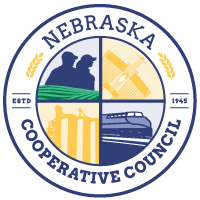About Us
The Nebraska Cooperative Council, located in Lincoln, Nebraska, is a statewide, non-profit, non-partisan trade association representing agricultural cooperatives.
It was formed in the fall of 1945 after a small group of cooperative leaders throughout Nebraska came together to discuss the idea of organizing a trade association for agricultural cooperatives. What evolved from a series of meetings of these individuals was the formation of the Nebraska Cooperative Council.
As a full-service trade association, the Council has played a key role in furthering the growth of cooperative businesses in the state. Currently, over 90% of the agricultural cooperatives in Nebraska are members of the Council; and the membership base includes not only farm supply and marketing cooperatives but also rural electric and telephone cooperatives; financial services cooperatives; regional cooperatives; and those providing services such as insurance, livestock marketing, communications, consumer goods, and others. In addition, members include auditing firms and other organizations serving cooperatives. The agricultural cooperatives that are members of the Council account for nearly $9 billion of economic activity each year.
While its mission has undergone revisions since it was organized, the Council has remained steadfast to its basic thrust: to defend, protect, and enhance the agricultural cooperative movement through proactive programs in education, legislation, governmental affairs, communication, and regulatory issues. That doesn’t mean that the major emphasis of its activities hasn’t changed over the years. Yet the Council has maintained the vision of its founders for a trade association committed solely to agricultural cooperatives.
A key advantage of membership in the Council is that cooperatives with varied business interests join together for unity of action to help maintain a strong presence in today’s complex business economy. Mutually beneficial relationships strengthen cooperatives and, as a trade association, are an important ingredient in the Council’s efforts. On many issues, the entire cooperative community working through the Council can have the greatest impact at both the state and federal levels. In other instances, the Council’s member cooperatives with similar business interests can develop the most effective coalitions to positively influence legislation and subsequent regulations.
